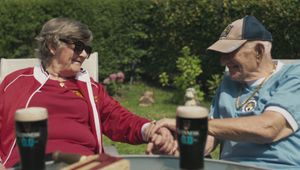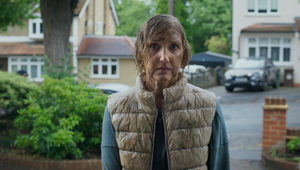
Making the Grade: Simona Cristea

Simona Cristea is one of the most sought after colourists in the industry, with more than 18 years experience working for leading international facilities from Bucharest to Mumbai and London. Simona has created lavish grades on hundreds of major campaigns, for the likes of Rolls Royce, Adidas, Louis Vuitton and Lancôme, with industry leading talents including Rankin, Warren & Nick, and Mert & Marcus.
Simona has collected numerous international awards for her work, is a fixture of Televisual’s prestigious ‘Top Ten Operators’ annual list and is a regular on craft juries for the likes of the British Arrows, D&AD, UK Music Video Awards and the APA Show.
LBB> What was your first experience with the world of colour grading – and when did you decide that being a colourist was a role that you wanted to pursue?
Simona> My moment of serendipity came whilst I was still an art student back in my hometown Bucharest. A friend told me that a post-production house was looking to recruit and train art students to become colourists. At that moment, I had very little knowledge of what a colourist actually was, or exactly what the job entailed but she encouraged me to go along with her to interview for it.
That was my ‘sliding doors’ moment I suppose. I’m incredibly fortunate and proud to have built my career as a colourist from that moment on. I do sometimes wonder what my life may have been like if I hadn’t decided to go along that sunny afternoon almost 20 years ago.
LBB> What was the project that you felt really changed your career?
Simona> I have worked on many amazing, award-winning films and I’ve been lucky enough to pick up a few awards along the way myself. However, when I look back on my career, I think it’s actually been the people I’ve worked with, rather than any particular project I’ve worked on, that has made the difference. It’s the strong relationships I’ve built, based on understanding, trust and respect.
Many directors, producers, creatives and DoPs I’ve worked with have become friends, some have become close friends, one even became my bridesmaid. It’s a great thing in life, to have a job where you get to work with your mates and you all help and support each other’s careers. That’s what really makes a difference.
LBB> How/where did you hone your craft and did you have any particular mentors?
Simona> I started my career in Bucharest, where I trained as a Telecine colourist. Everything was shot on film back then and I had a few really good mentors who taught me how to work with a Spirit Datacine and a Pogle colour corrector. With that kit you’d be grading straight from the negative. That was a beautiful thing.
Having had that experience, in the pre-digital days, gave me a strong foundation knowledge. It helped me hone my craft and shaped my creative sensibility. Grading film you learn to appreciate that less is often more. There’s so much already in those magic layers of crystals, silver and gelatine. You learn to not overwork a grade with unnecessary nodes and LUTs.
There have been several colourists who have inspired me. I’ve been fortunate enough to have ended up working with some of them too. They have offered me guidance and helped me in my career. Tareq Kubaisi taught me how to run a room and gave me my first break in London and Simone Grattarola brought me into Rushes and let me do my thing.
I’m inspired every day by many of my peers and call a lot of them friends too. Including my incredible team at Coffee & TV: Katie, George and Tash.
LBB> Tell us more about your creative process - (e.g.when you get a project, how do you go about developing a look?)
Simona> It all starts with the brief. The most important thing is to understand what the client wants from the grade. We’ll get together and have a good chat about the film; what the tone of it is, what sort of feelings, messages and emotions they wish to get across. At this point I’m after as much information as possible. References are also always welcome and useful.
It’s important to understand their vision and what the film is about. From that bases, we’ll set out to create and develop the look.
LBB> From experience, we’ve found that colourists often love art and photography - when you’re out of the studio, what inspires you?
Simona> I love watching movies and indeed photography. I also paint in my spare time, I find that very relaxing and inspiring.
LBB> What are your thoughts about working on film versus digital formats like 4K? And what are your favourite techniques for capturing a vintage or tactile feel?
Simona> I started my career working on film for many years. Film and digital both have their own place. Nowadays it can be very tricky in fact for some people to tell the difference but ultimately, I still feel real film always looks better than digital, in my opinion. Take Christopher Nolan’s films for example; they are visual masterpieces, all shot on film. Just beautiful.
Digital however does offer you incredible scope and control over the image. I remember there was a spot for Fentiman’s I worked on, which I think was their first ever TV ad, and they wanted the campaign to reflect the brand’s early 20th-century origins. Stylised as an Edwardian seaside peepshow and featuring a myriad array of kinky characters, the director Fern Berresford had a very clear vision for the look of the film and we set about creating a look referencing vintage hand painted Edwardian photographs.
LBB> When working in commercials, what role can colour and a grade play in enhancing a brand’s assets and what sort of conversations do you have with creatives and clients about that (e.g. is there often a strategic/consistent ‘look’ for a brand? Can these be too heavy handed?)
Simona> In grading commercials there are so many factors that can influence the look of a film. It’s usually a balance between the director’s vision, the agency and the clients specific requests.
I think that one of the most important things in grading commercials is to master that balance between all the opinions involved and come up with a beautiful looking film at the end of it.
There are particular looks that you know from experience will work for particular genres or brands. It’s usually quite obvious from the type of film you’re working on, to know whether to go more naturalistic or more stylised for example.
Sometimes clients are looking for a lot of your input, other times they’ll have very clear and set ideas about how they want their film to look and your job is to help them realise that. Ultimately film is a collaborative artistic endeavour, where people work together to achieve a creative vision.
LBB> How do you ensure that each colourist-director partnership is a success?
Simona> I like to think that I’m a good listener, so I can understand the brief and the clients vision. I appreciate that each project is someones baby - my job is to help them deliver it.
LBB> What advice would you give to budding colourist?
Simona> Work hard and play harder. It’s always good to back yourself but humility goes a long way too. Have patience. Even if you become the next big thing in grading, you’ll need to continue to work hard to be relevant - that’s the tricky part. Experience will bulletproof you against any challenging situations. Listen to your peers, learn from mistakes and be nice.
LBB> In your opinion, what’s difference between a good grade and a great grade?
Simona> A great grade is one that looks amazing without looking ‘graded’.
LBB> How is the craft and trade of colour grading changing?
Since I started, the industry has changed a lot. I graded film for ten years and almost overnight everything was shot on digital cameras. Back in the day the grade suites used to cost millions, now not so much, even though it still tends to be the most expensive room in the building. The pandemic showed us that we can grade from home studios now, that’s a first for me but something to really embrace.















